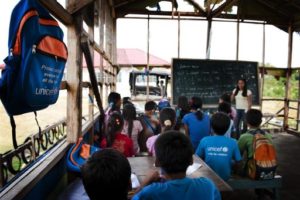Feeding program for students to continue amid pandemic in the Philippines
The feeding program for children will continue despite blended learning approaches in schools amid the coronavirus disease (Covid-19) pandemic, Malacañang said. In a Palace press briefing, Presidential Spokesperson Harry Roque said instead of preparing hot meals for students, nutritious food products will be delivered to…
The feeding program for children will continue despite blended learning approaches in schools amid the coronavirus disease (Covid-19) pandemic, Malacañang said. In a Palace press briefing, Presidential Spokesperson Harry Roque said instead of preparing hot meals for students, nutritious food products will be delivered to households or picked up by parents from schools.
“Hinahatid po ng barangay sa mga malnourished na mga mag-aaral ang libreng at masustansiyang tanghalian sa kanilang mga bahay (The barangay will deliver them to the homes of malnourished students the free nutritious lunch right in their homes),” he said.
Last month, the Department of Education (DepEd) said there will be changes in the feeding program since learning will now be home-based.
Due to the changes in the school calendar, DepEd Undersecretary Nepomuceno Malaluan said the feeding period for this school year is reduced to 60 days for the regular component, which includes nutritious food products, and 50 days for the milk component. Blended learning strategies involve the use of TV and radio-based instruction, as well as modular and online learning.
In June 2018, President Rodrigo Duterte signed into law Republic Act No. 11037 or the Masustansyang Pagkain Para sa Batang Pilipino Act, which establishes a national feeding program for undernourished children in public daycare centers, kindergarten, and elementary school.
Under the law, the government shall provide a supplemental feeding program for daycare children, a school-based feeding program for public school children from kinder to Grade 6, a milk-feeding program, a micronutrient feeding program, health examinations, vaccinations, and deworming among others.
The law also includes the creation of a National Nutrition Information System which will harmonize all existing national and local nutrition databases to identify individuals, groups, and/or localities that have the highest magnitude of hunger and undernutrition.
Feeding program for students to continue amid pandemic – Philippines News Agency
